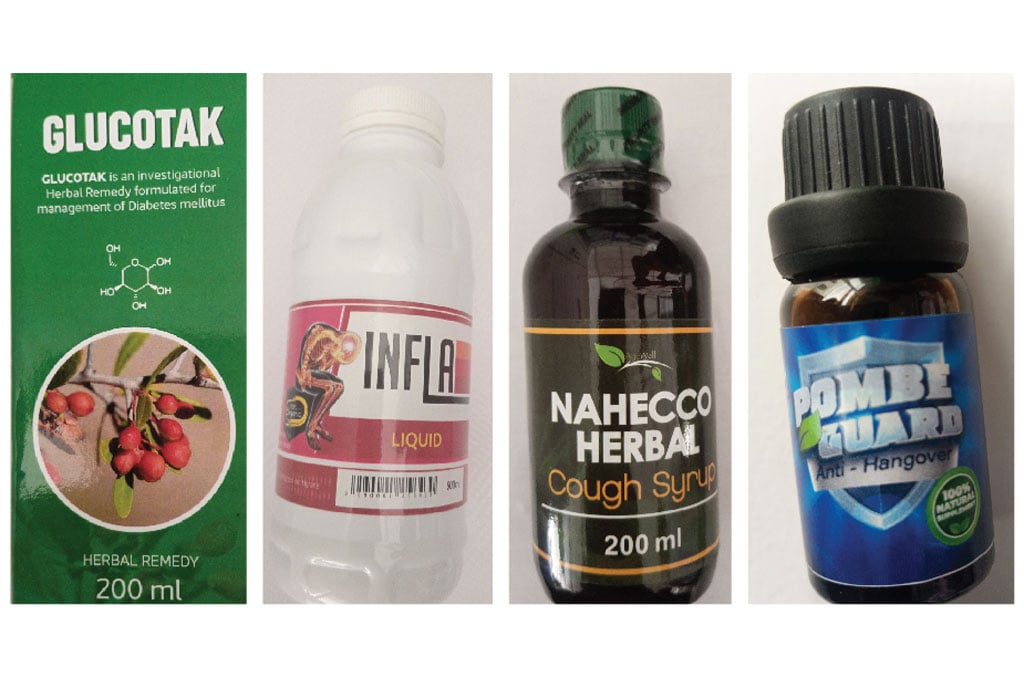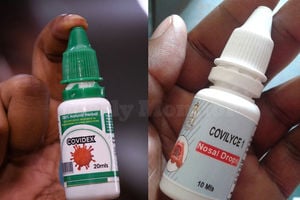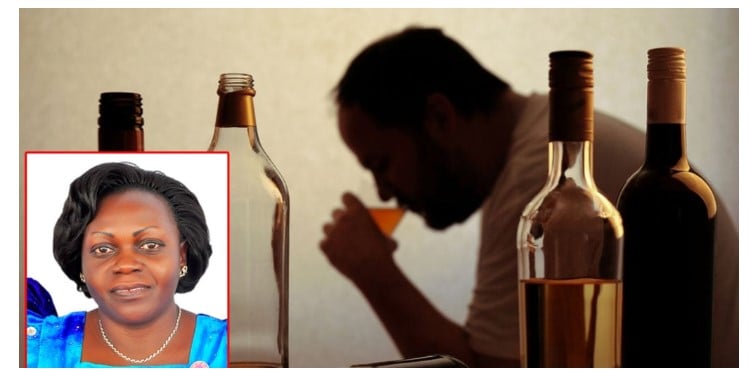
Scientists analyse drugs at the National Drug Authority Laboratory in Mulago, Kampala on December 9, 2021. PHOTO |FILE
The unceasing tension between herbalists and the National Drug Authority (NDA) over fears of losing their innovations once they open up to the drug regulator, is contributing to the plague of uncertified herbal medicines, risking consumer health.
This tension has resulted in many herbalists not submitting their medicines for NDA product notification (registration). Product notification (registration) is a critical marketing authorisation procedure which involves safety and efficacy assessment of the medicines by the NDA to safeguard consumers.
These uncertified (unregistered) herbal medicines are already being sold to people in a country where, according to the Natural Chemotherapeutics Research Institute (NCRI) of the Health ministry, more than 60 percent of the population uses herbal and traditional medicine. In the NDA product notification process, herbalists are required to, among other things, reveal the names of plants or ingredients in the herbal medicines.
John Mwanga, a herbalist from Kyebando in Kampala, who has been making herbal medicines for about a decade, says he is yet to get his products approved by the NDA. Mwanga, a scientist by training, makes a range of herbal medicines for eye problems, arthritis, and erectile dysfunction. He also makes some crop stimulants.
He links this delay in getting the initial approval (NDA product notification) to the cost involved in certification and the fears of losing his intellectual property rights, but NDA dismissed the fears.
“Medicine means a secret; If you don’t keep that secret, you will never achieve anything,” Mwanga tells our reporter in an interview at Makerere University. “I fear to reveal the ingredients in this product [for eye health]. If you look at this product, I can win a gold medal. You imagine you are going to reveal what is in it!"
Mwanga was one of the herbalists and traditional healers showcasing their products during the African Traditional Medicine Day conference on Thursday.
Dr Francis Omujal, a senior researcher at the NCRI also reveals that several herbalists have approached him asking whether there is another way to submit their products to the authority without exactly mentioning the plants used.
“NDA is telling herbalists to declare the plants, that is their [herbalists’] identity. The herbalists are saying 'Is there another way of regulating without asking us [herbalists] to declare the plants?'” he says.
Dr Omujal observes that although Uganda has introduced a law to regulate traditional medicine, there are still many challenges hindering the implementation of the law.
“Information on research on herbal medicine is still limited, and standardisation is limited as well. Uganda has tried her best. Right now we have the Traditional and Complementary Medicine (TCM) Act, 2019 and relevant policies but there are regulatory issues still coming up. The Act is there but there is no governing council,” he notes.
“There is a lack of scientific fact. Right now, people [herbalists] are saying they are healing and curing [people] but NDA says “No, you are not curing, you are not healing”. We need to harmonise some of the terms, what we [NDA] mean by “cure” might be different from the meaning in the local language. We need to be very clear,” he adds.
Commenting on issues around intellectual property rights and the unwillingness of herbalists to declare the plants in the medicines, Dr Michael Mutyaba, the NDA head of the herbal medicine arm, says the herbalists lack knowledge.

Dr Alice Lamwaka in the lab where Gulu University developed the Covilyce-1 herbal medicine on July 13, 2021. PHOTO/FILE
“If your product has eucalyptus it should be indicated on your label. This is your role as a manufacturer, it is not you who is going to distribute your product. A doctor who is giving the patient your product should know. People have allergies to food, what if your products cause allergy to them,” he says.
“People talk about intellectual property (IP), your IP is not the tree that you got the product from, it is how you make your product. Have you used leaves, stems or roots? Have you boiled, immersed in water or steamed? That is your IP –it is the manufacturing process. The challenge we have is the knowledge gap, someone thinks the tree is their IP,” he adds.
Dr Mutyaba also says they have expanded the capacity of their Kampala-based laboratory to test samples of herbal products submitted for quality tests and registration. He says products that fail the tests, NDA engages the herbalist to improve their capacity. He advises the public to only buy herbal products from licensed pharmacies and drug shops that should only sell registered products. The NDA website also has a list of registered herbal medicines, currently totalling at least 300.
According to information from the NDA, the pharmaceutical information which should be made available at the time of registration/notification includes the product name; name of the active or main constituent/plant source of the active ingredient; and indications (use/what it treats).
The other information for product registration includes dosage forms, for example, tablet, powder, ointment, capsule, syrup, powder, liquid; strength of dosage form, where applicable; and excipients such as starch, and honey if used. The manufacturer should also indicate major adverse effects/side effects, storage conditions, shelf life/expiry date and name and address of the manufacturer.
Uganda can't give patents
Mr Kafunjo Twinomujuni, the Manager of Traditional Knowledge at Uganda Registration Services Bureau (URSB) says herbalists who want to patent their products should either go to Kenya or get approval through a continental organisation because Uganda is not allowed to give patents for pharmaceutical products.
"There are about six national laws regarding IP. There is an industrial property act that deals with patents. For the traditional healers, you can get a patent for your processing of the medicine -identifying active ingredients in different plants and then that formulation you can get a patent," he explains.

He continues: "But currently, as a country, we don't grant patents for medicines because there are some limitations at the world level -which we call the TRIPS agreement where we have flexibility. Because we are still a developing country, we can not protect because if we protected patents for pharmaceuticals, the developed world would come and swallow up all the market [because they hold/own most of the patents for products used] and we would have a problem."
"You can still protect your patent by going to Kenya which is a middle-income country or you protect at the Africa Region Intellectual Property Organisation (ARIPO) where Uganda is a member-state, you come to URSB and we guide you on how to apply for your patent," he adds.
The TRIPS Agreement requires member countries to make patents available for any inventions, whether products or processes, in all fields of technology without discrimination, subject to the normal tests of novelty, inventiveness and industrial applicability, according to information from the World Trade Organisation.
According to information in a January 2020 policy brief by three organisations, including the Centre for Health, Human Rights and Development (CEHURD), in the TRIPS Agreement, under the transition period for patents on pharmaceuticals for Least Developed Countries (LDCs), “Unlike Kenya, which is categorised as a developing country, Uganda as an LDC is currently not required to grant or enforce patents on pharmaceuticals until 2033.”
The organisations explained: “The spirit of this provision is to allow time for transfer and/or development of technological capacity for local pharmaceutical production in LDCs.”
Cost of patenting
Information from the European Union (EU) intellectual property helpdesk and the Kenya Institute For Public Policy Research And Analysis (Kippra), indicate that for foreigners registering patent in Kenya, one requires upwards of $2,000 (Ushs7.6 million) to register a patent, professional fees included. EU indicates that “total fees, assuming all 18 Harare Protocol states, including Kenya, are designated and payment of the first annuity fee”, it is “US$2,662 (about UShs10 million).” This is for patenting through ARIPO.
Mr Kafunjo, however, says, there is a Trade Secret Protection Act, which can work for traditional healers (spirituality). "That is also an IP law that was enacted in 2009. Kazire manufactures pharmaceutical products from herbal medicines but they will never disclose the formula they use, it remains a trade secret. That is another law that protects traditional healers," he explains.
Cost of registering herbal medicine
Mr Mwanga says the cost involved in getting the products registered with NDA is also a hindering factor. He acknowledges that registering the product would be a game changer in his earnings.

Dr Grace Nambatya from Natural Chemotherapeutics Research Institute addresses the press on the Africa Traditional Medicine Day in Kampala on September 23. PHOTO | ISAAC KASAMANI
“The other time, I was at NCRI, they told me phytochemical examination is Shs250,000. But they also require microbiology examination. The entire thing can be around Shs500,000. It is a good thing because if they do it I will ease marketing in Uganda and beyond,” he says. But NCRI mentioned a lower amount of money. Mwanga says he also incurred other costs during product development.
Dr Grace Nambatya, the NCRI Director, who also sits on the NDA Board, says the initial approval of herbal medicine (product registration) takes around three months.
“When you have a product [herbal medicine], you should bring the samples to us [NCRI which is at Wandegeya) for assessment on safety” she says.
Joseph Muyanja, one of the government scientists who assesses herbal products before getting NDA approval, says they test for the presence of specific plant chemicals which kill bacteria, fungi or viruses.
“The phytochemical tests [assessing plant chemicals of medicinal value] costs around Shs100,000. After this, the toxicity tests are done to ensure the product is not harmful. This requires around Shs150,000, the developer should buy laboratory animals [guineas pigs or rats] where the product is tested on,” he says.
Dr Nambatya says after completing the steps, the NDA verifies the results and validates a product so that the developer can proceed to do mass manufacturing and sales.
She, however, warns developers not to use the word “cure”. She says a product can only be declared as a cure after completing clinical trials, which used to take up to six years, but with the advent of Covid-19, trials for vaccines have been done in just about a year. However, the trials also require billions of shillings, which many herbalists in Uganda may not be able to afford.
NCRI and government scientists have conducted clinical trials for one herbal medicine –UBV-01N, a product which was indicated for managing Covid-19, but the results have not been made public. She also notes that there is a need to boost post-market surveillance to ensure adherence to standards in all manufacturing processes even after the product registration.
TRAINING FOR HERBALISTS
Mr Jamil Lutaakome Mukwaya, the president of the Uganda Herbalists Association, who also sits on the NDA Board, says they are working with the government to sensitise herbalists and bridge the knowledge gap and improve product quality. “When you compare the knowledge gap between the herbalists and the scientists, there is a vacuum but through sensitisation, we are linking them up to different facilities to take their products for analysis,” he says. Mr Mukwaya adds: “In NDA, we have an approach of sensitising herbalists across the country. In every quarter of the year, we have specific districts where we go and mobilise those traditional health practitioners. We gather them and give them information.” “We are also grateful that NDA in conjunction with the Directorate of Industrial Training, we developed a curriculum which is used to train traditional health practitioners so that they can acquire a document which can help to introduce them to any facility/office as skilled [trained] herbalists,” he adds. Mr Mukwaya appeals to the government to expedite the establishment of the council for regulating herbalists and traditional healers. He says about half of the practitioners in the country are quacks. “The delays by the government to operationalise the TCM Act are some of the major hindrances to addressing the issue of quacks. We need the council to be put in place in line with the TCM Act, the council will register the genuine herbalists and the quacks will be out,” Mr Mukwaya adds. “However, the cost also needs to be talked about because some may not have money for testing the medicines yet the medicines such as the one for cancer, may be highly needed,” he adds.







